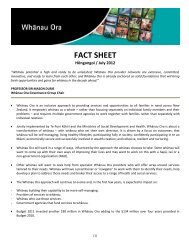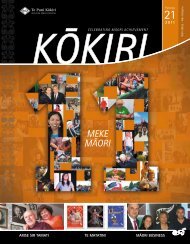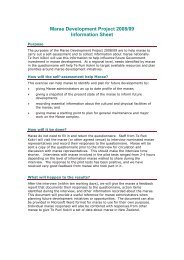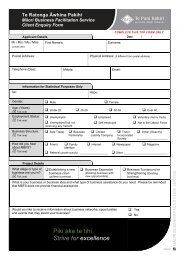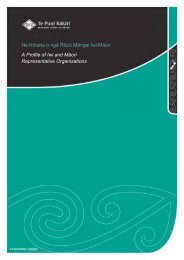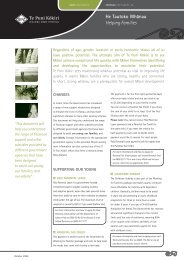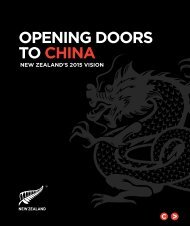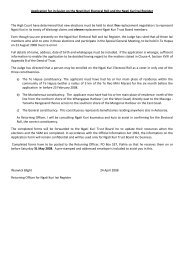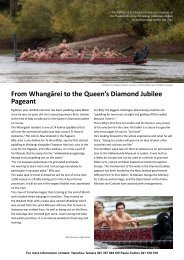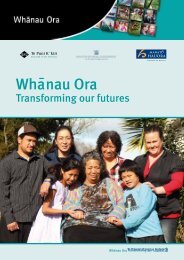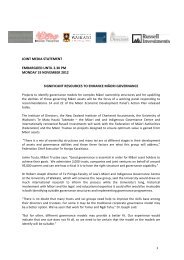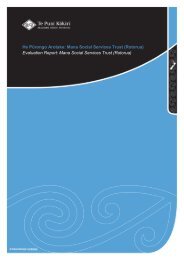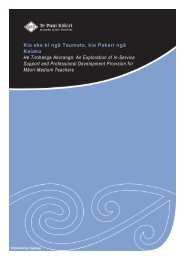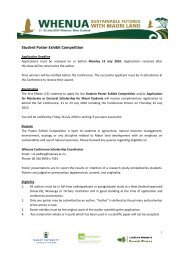Wha¯nau ora update - Te Puni Kokiri
Wha¯nau ora update - Te Puni Kokiri
Wha¯nau ora update - Te Puni Kokiri
You also want an ePaper? Increase the reach of your titles
YUMPU automatically turns print PDFs into web optimized ePapers that Google loves.
Whānau Ora Update<br />
for District Health Boards<br />
Issue 2 – October 2011<br />
Whānau Ora leads to new way of contracting<br />
Months of hard work and commitment has paid<br />
dividends for the Bay of Plenty District Health<br />
Board, which recently signed three integrated<br />
contracts with Whānau Ora providers.<br />
The DHB is now one of the funders in an<br />
integrated contract with Pirirakau Hau<strong>ora</strong><br />
(Tauranga), Ngai Tai Iwi Authority (Torere, Opotiki)<br />
and Whai<strong>ora</strong>nga Trust (Tauranga).<br />
Janet McLean, the DHB’s general manager for<br />
Māori Health Planning and Funding, said DHB<br />
staff worked closely with the Ministry of Health, <strong>Te</strong><br />
<strong>Puni</strong> Kōkiri, Ministry of Social Development (MSD)<br />
and Māori providers to support an integrated<br />
Whānau Ora delivery model with a strong focus<br />
on positive outcomes for whānau.<br />
Janet said outcomes-focused integrated contracts<br />
mean funding agencies have to change the way<br />
they have traditionally funded services, based on<br />
outputs and inputs.<br />
‘The DHB is now sitting around the table with<br />
other funders and the provider and having a new<br />
conversation about outcomes and what success<br />
looks like,’ Janet said.<br />
‘This includes discussing how we will report,<br />
and show what we are funding and delivering is<br />
actually making a difference for whānau.’<br />
For providers, integrated contracts offer improved<br />
operating efficiencies and more streamlined<br />
reporting requirements. This gives them more<br />
time to spend on service development and<br />
improving their responsiveness to the aspirations<br />
of whānau, as they deliver holistic whānaufocused<br />
services.<br />
Bay of Plenty DHB Māori Health Planning and Funding team<br />
Back row: Dillon <strong>Te</strong> Kani, Kiri Peita, Kym Richards, Jackie Davis, Connie Hui,<br />
Annette Copeland. Front row: Dr George Gray, Cynthia Turuwhenua, Janet McLean<br />
(GM), John Welch and his daughter Maddison<br />
Equally as important, the integrated contract also<br />
allows providers to tell their stories, noting exactly<br />
how they are improving the lives of whānau.<br />
The DHB’s Māori Health Planning and Funding staff<br />
worked through a rigorous integrated contracts<br />
process over about six months before the DHB<br />
signed up to its first three integrated contracts.<br />
This included the following:<br />
• Completing due diligence on all its Whānau<br />
Ora providers to identify which ones were<br />
ready for an integrated contract. Staff used the<br />
MSD’s High Trust Contracts tools to help with<br />
this huge chunk of work.<br />
• Working closely with the MSD integrated<br />
contracts advisor responsible for the Bay of<br />
Plenty.<br />
1 Whānau Ora Update No.2 – October 2011
• Organising workshops with key DHB<br />
personnel – the chief financial officer, legal<br />
advisor, general managers, planning and<br />
funding portfolio managers and business<br />
analysts – to ensure everyone had a shared<br />
understanding of the policy drivers, including<br />
the organisational approach and plan.<br />
• Getting DHB Funding Management Committee<br />
approval to progress integrated contracts.<br />
• Drafting a proposed contract on the outcomes<br />
already identified, to put to providers at the<br />
first round-table meeting.<br />
• Meeting with providers, other funders and<br />
MSD’s national integrated contracts advisor to<br />
discuss the contract.<br />
• Getting Funding Management Committee<br />
approval of the final contracts.<br />
• Making sure the DHB’s governance and<br />
compliance expert also reviewed the final<br />
contracts before they were signed.<br />
Janet said strong relationships at all levels were<br />
crucial to the success of Whānau Ora.<br />
<strong>Te</strong> Ao Hou (Eastern Bay of Plenty) – in the Bay of<br />
Plenty. These collectives representative a total of<br />
18 different providers.<br />
Janet’s tips for embedding<br />
Whānau Ora change<br />
• Make sure you have effective leadership<br />
and organisational commitment at a<br />
governance and executive level.<br />
• Have a dedicated staff member to<br />
champion, lead and implement the<br />
change within the DHB.<br />
• Create opportunities for teams to give<br />
feedback on policy papers, submissions,<br />
proposals and contracts and to adopt a<br />
learning and applied research approach<br />
to the implementation.<br />
• Leverage off the Whānau Ora regional<br />
leadership group relationships,<br />
networks, and work streams to advance<br />
the implementation.<br />
There are two Whānau Ora collectives – Ngā<br />
Mataapuna Oranga (Western Bay of Plenty) and<br />
Integrated contracts talks<br />
Twelve Māori health providers in Whānau Ora<br />
collectives are scheduled to begin integrated<br />
contracts talks in October/November.<br />
They are:<br />
• Turuki Health Care<br />
• Papakura Marae<br />
• <strong>Te</strong> Kaha o <strong>Te</strong> Rangatahi<br />
• Huakina Development Trust<br />
• Manukau Urban Māori Authority<br />
• <strong>Te</strong> Rūnanga o Kirikiriroa<br />
• Ngāti Hine Health Trust<br />
• Hau<strong>ora</strong> Hokianga Health Trust<br />
• Ngāpuhi Iwi Social Services<br />
• <strong>Te</strong> Kotahitanga E Mahi Kaha<br />
• <strong>Te</strong> Rūnanga A Iwi O Ngāpuhi<br />
• Whangaroa Health Services<br />
The Ministry of Social Development is currently<br />
working on an integrated contracts resource kit,<br />
which should be available to DHBs in the next<br />
month. Initial resources will be frequently asked<br />
questions on integrated contracts, a fact sheet<br />
and a powerpoint presentation.<br />
2 Whānau Ora Update No.2 – October 2011
Action research process<br />
Assessments began this month on Whānau Ora<br />
action research plans.<br />
The first to go through the assessment process<br />
was from the Whakauae action research group,<br />
which is working with <strong>Te</strong> Oranganui Iwi Health<br />
Authority Primary Health Organisation in<br />
Whanganui.<br />
Action research is the approach being used<br />
to gather evidence of whānau-centred service<br />
delivery and development.<br />
Action researchers have been contracted by<br />
<strong>Te</strong> <strong>Puni</strong> Kōkiri (TPK) to work with Whānau Ora<br />
collectives and whānau to produce the plans,<br />
which then go to an assessment panel.<br />
This panel has representatives from TPK, the<br />
Ministry of Health and the Ministry of Social<br />
Development – including its action research<br />
advisor Dr Fiona Cram.<br />
To ensure a comprehensive health sector<br />
response, the Ministry of Health has asked DHB<br />
representatives to help evaluate the plans.<br />
The action research plan assessment process is<br />
below.<br />
Each Monday, <strong>Te</strong> Kete Hau<strong>ora</strong> will contact any<br />
DHBs that need to be part of an assessment, and<br />
provide all relevant documentation. The panel<br />
assessments are expected to be held on the<br />
Thursday of the same week.<br />
If you have any queries, please contact L<strong>ora</strong>in<br />
Kern-Smith: L<strong>ora</strong>in_Kern-Smith@moh.govt.nz<br />
What<br />
Step one: Initial check<br />
Step two: Assessment<br />
Step three: Final decision<br />
Step four: Notify<br />
assessment panel<br />
Step five: Notify<br />
researchers<br />
Description<br />
TPK does a preliminary check to make sure the plan has all the required<br />
components.<br />
The plan is sent to panel members to assess, using a supplied scoring<br />
sheet. DHB representatives will be sent all relevant material by the<br />
Ministry of Health. DHB responses will inform the health assessment of<br />
each plan.<br />
TPK will make the final decision on each research plan, informed by<br />
the health assessment panel’s recommendations and advice from<br />
the Ministry of Social Development. Where recommendations differ<br />
significantly, TPK will convene a panel discussion for further clarification.<br />
TPK will notify the assessment panel, including a summary of comments.<br />
The Ministry of Health will send this material to DHB representatives who<br />
contributed to the process.<br />
TPK will notify researchers of the decision.<br />
3 Whānau Ora Update No.2 – October 2011
In brief<br />
OPF amendment<br />
The National Health Board recently made a<br />
significant addition to the Operational Policy<br />
Framework (OPF) to support DHBs moving to<br />
integrated contracts with their service providers.<br />
The changes formalise integrated contracts<br />
as a legitimate tool DHBs can use within the<br />
accountability framework. They also clarify how<br />
service specifications and purchase units are to<br />
be applied when integrated contracts are used.<br />
The <strong>update</strong> became effective on 1 September.<br />
The amended OPF can be found on the<br />
Nationwide Service Framework Library (NSFL)<br />
website www.nsfl.health.govt.nz<br />
An integrated contract template can be found on<br />
the NSFL website by following the ‘Resources’ link<br />
to ‘Contracting Information’.•<br />
Online access for this<br />
newsletter<br />
Copies of the regular Whānau Ora electronic<br />
newsletter <strong>update</strong>s we are providing for DHBs will<br />
be placed on the Nationwide Service Framework<br />
Library website, www.nsfl.health.govt.nz •<br />
Information kits<br />
Looking for extra Whānau Ora material to share<br />
with colleagues or at a hui? <strong>Te</strong> <strong>Puni</strong> Kōkiri (TPK)<br />
now has Whānau Ora information kits available.<br />
You will get an A4-sized presentation folder with<br />
current publications and TPK <strong>update</strong>s. Email<br />
requests to whanau<strong>ora</strong>@tpk.govt.nz and allow<br />
10 working days for your request to be actioned.•<br />
Success stories<br />
Do you have any Whānau Ora successes or story<br />
ideas you would like to share with other DHBs<br />
through this newsletter? Please email<br />
Marama_ellis@moh.govt.nz with your ideas.•<br />
4 Whānau Ora Update No.2 – October 2011



